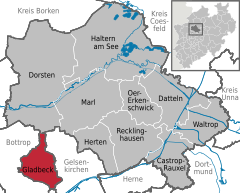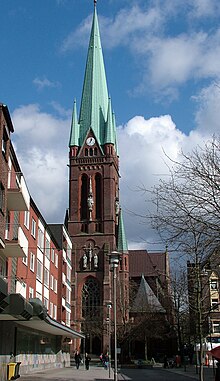Gladbeck
The village with its five peasantries (Butendorf, Brauck, Rentfort, Ellinghorst and Zweckel, now quarters of Gladbeck) was arranged around St. Lamberti cathedral.
A certificate from 1236 mentions Knight Ludolfus de Wittering who is most likely to have erected Wittringen Castle around that time.
At the 1815 Congress of Vienna the Kingdom of Prussia acquired the area and administered it within the Province of Westphalia.
Also Gladbeck benefited from the general boom in the years 1925 to 1929 when important building projects were realised in spite of all troubles, such as the open-air bath as well as the stadium, in which Adolf Hitler delivered a speech in 1932.
This took place under the earlier elected conservative mayor Bernhard Hackenberg, immediately joining the Nazi Party.
Since the last coal mine was closed in 1971 Gladbeck is fighting against a high rate of unemployment, activating the structural change.
In the course of the communal realignment in North Rhine-Westphalia (1975) Gladbeck, original a county borough, and the village Kirchhellen were incorporated into the neighbouring town Bottrop.
On 16 August 1988, the town received international attention when two thieves robbed a branch of the Deutsche Bank in Gladbeck.
They kidnapped two bank employees and held them hostage, along with 32 people in a transport bus in Bremen and drove through West Germany and the Netherlands.
The most recent city council election was held on 13 September 2020, and the results were as follows: The list[3] below gives an overview about the results of the last eight council elections: Gladbeck's city arms is portrayed in black, red and yellow and has a red bettlement as a sign of the received municipal law from 1919.
The black clasps on the right side are taken from the blazon of the Lords of Brabeck, having possessed the moated castle Wittringen at the end of the 14th century.
The museum shows the development of the region from the geological origins of its rich coal supplies to the first inhabitants and the present days.








